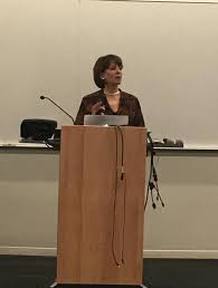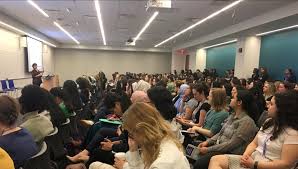|
By Poornima Peiris
Sara Laschever, the keynote speaker at this year’s Scientista Symposium, gave Scientistas the facts behind the art of negotiating and why men always have an upper hand when it comes to self-advocacy. What’s the story behind this discrepancy? As summarized by Laschever, even when men only have 60% of the qualifications, they still take the initiative to ask for their share of the deal. Women still view themselves as unqualified for a role even when they hold 90% of the qualifications. Men and women also hold different perspectives when it comes to negotiating. Women view the act of negotiation with trepidation, like a visit to the dentist’s office, while men view it as a game with the goal of a triumphant win. Sara Laschever is an author on several books about women and career obstacles and teaches workshops on workforce challenges for women. “Women, even at a younger age, are raised to be needy, while men are taught to be independent,” says Laschever. These stereotypes are reinforced throughout their lives. The ambitious go-getter attitude is reserved for the male persona while the female persona is expected to be accommodating and soft-spoken. Therefore, the women who adopt characteristics typically attributed to men, such as being proactive, outspoken, and ambitious, are seen as aggressive in the workplace. This display of behavior is seen as admirable and even welcomed in men, but women are often punished for displaying ambition - especially by other women. They are criticized for not being team players and coworkers will no longer invite them to collaborate on projects. Women are often rebuffed for being forward with their goals, unlike men who are rewarded for their determination. This lays the foundation for why women fail to negotiate on their own behalf, for fear of being ostracized by their peers and damaging their own career. Laschever shared several case stories in which women failed to negotiate for their fair share of the deal. A group of Harvard Medical School women realized after 8 years that the male surgeons in the group had a Tennis round robin group with their mentors. The men excluded the women from joining the group because the women simply did not inquire about this kind of gathering. This case demonstrated a lost opportunity for these women to form enduring and strong relationships with their mentors outside of work. In another case, a female graduate student learned that because she did not inquire about funding opportunities for a conference, she was not made aware of grants available for conference attendance. Meanwhile, male graduate students who simply inquired about funding received travel awards for the conference. Perhaps the most memorable example in Laschever’s talk involved negotiation in non-human animals. She discussed an experiment that studied a pair of monkeys, in which one was given food and the other was given a rock. The monkey who received a rock demonstrated his unhappiness by throwing the rock at the scientist, demanding that he also be treated to the better deal: food. The description of this comedic scene was welcomed with a great round of applause and laughter from the Scientistas at the event. The results of this experiment, however, highlight an important difference that can greatly disadvantage women in their careers. Women often hold back rather than risk failure, and thus it is important to teach females to embrace failure and courageously pursue their goals. “If monkeys don’t want to be treated unfairly, neither should you,” said Sara Laschever. Finally, here are some key strategies that she shared with the Scientistas about the art of negotiating:

About the Author
Poornima Peiris is an engineer interested in all things STEM related. She is the founder of an initiative encouraging women and minorities to pursue STEM related careers. She has conducted research in various stem disciplines at national labs and was a participant of NASA's space grant program. She is currently working on producing her own science podcast with her local community. Her scientific contributions include a publication in a scientific journal & besides reading up on scientific innovations, she also loves to read books on neuroscience, paint landscapes & create personalized wedding gifts. Aside from dabbling in the creative arts, she does fencing & tennis. Always a Sri Lankan at heart, she loves the ocean & spring weather. She currently splits her time between Massachusetts & New York. Comments? Leave them below!
0 Comments
Your comment will be posted after it is approved.
Leave a Reply. |
CONNECT WITH USSUBSCRIBE |
The Scientista Foundation, Inc. All Rights Reserved © 2011-2021 | Based in NY | contact@scientistafoundation.org
The Network for Pre-Professional Women in Science and Engineering
The Scientista Foundation is a registered 501(c)(3) -- Donate!
The Network for Pre-Professional Women in Science and Engineering
The Scientista Foundation is a registered 501(c)(3) -- Donate!





 RSS Feed
RSS Feed